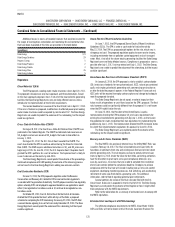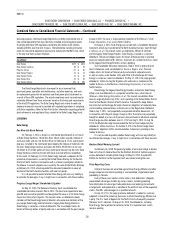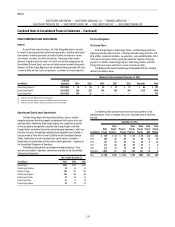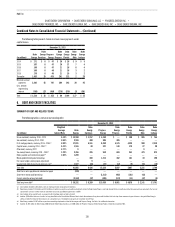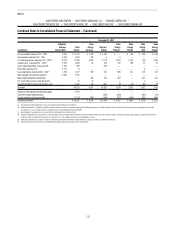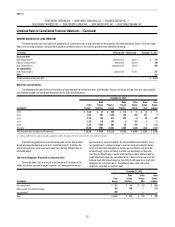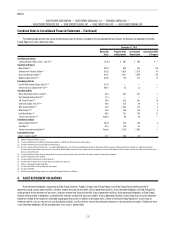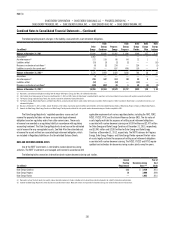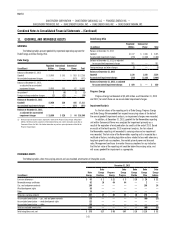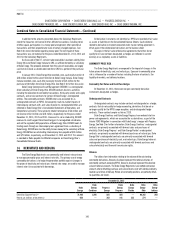Duke Energy 2013 Annual Report Download - page 153
Download and view the complete annual report
Please find page 153 of the 2013 Duke Energy annual report below. You can navigate through the pages in the report by either clicking on the pages listed below, or by using the keyword search tool below to find specific information within the annual report.
135
PART II
DUKE ENERGY CORPORATION • DUKE ENERGY CAROLINAS, LLC • PROGRESS ENERGY, INC. •
DUKE ENERGY PROGRESS, INC. • DUKE ENERGY FLORIDA, INC. • DUKE ENERGY OHIO, INC. • DUKE ENERGY INDIANA, INC.
Combined Notes to Consolidated Financial Statements – (Continued)
OTHER DEBT MATTERS
In September 2013, Duke Energy led a registration statement (Form S-3)
with the SEC. Under this Form S-3, which is uncapped, the Duke Energy
Registrants, excluding Progress Energy, may issue debt and other securities
in the future at amounts, prices and with terms to be determined at the time
of future offerings. The registration statement also allows for the issuance of
common stock by Duke Energy.
Duke Energy has an effective Form S-3 with the SEC to sell up to
$3 billion of variable denomination oating-rate demand notes, called
PremierNotes. The Form S-3 states that no more than $1.5 billion of the notes
will be outstanding at any particular time. The notes are offered on a continuous
basis and bear interest at a oating rate per annum determined by the Duke
Energy PremierNotes Committee, or its designee, on a weekly basis. The interest
rate payable on notes held by an investor may vary based on the principal
amount of the investment. The notes have no stated maturity date, are non-
transferable and may be redeemed in whole or in part by Duke Energy or at the
investor’s option at any time. The balance as of December 31, 2013 and 2012
was $836 million and $395 million, respectively. The notes are short-term debt
obligations of Duke Energy and are reected as Notes payable and commercial
paper on Duke Energy’s Consolidated Balance Sheets.
At December 31, 2013 and 2012, $811 million and $734 million,
respectively, of debt issued by Duke Energy Carolinas was guaranteed by Duke
Energy.
Money Pool
The Subsidiary Registrants, excluding Progress Energy receive support for
their short-term borrowing needs through participation with Duke Energy and
certain of its subsidiaries in a money pool arrangement. Under this arrangement,
those companies with short-term funds may provide short-term loans to
afliates participating in this arrangement. The money pool is structured such
that the Subsidiary Registrants, excluding Progress Energy separately manage
their cash needs and working capital requirements. Accordingly, there is no net
settlement of receivables and payables between money pool participants. Duke
Energy (Parent), may loan funds to its participating subsidiaries, but may not
borrow funds through the money pool. Accordingly, as the money pool activity
is between Duke Energy and its wholly owned subsidiaries, all money pool
balances are eliminated within Duke Energy’s Consolidated Balance Sheets.
Money pool receivable balances are reected within Notes receivable from
afliated companies on the respective Subsidiary Registrants’ Consolidated
Balance Sheets. Money pool payable balances are reected within either
Notes payable to afliated companies or Long-term debt payable to afliated
companies on the respective Consolidated Balance Sheets.
Restrictive Debt Covenants
The Duke Energy Registrants’ debt and credit agreements contain various
nancial and other covenants. The master credit facility contains a covenant
requiring the debt-to-total capitalization ratio not exceed 65 percent for each
borrower. Failure to meet those covenants beyond applicable grace periods
could result in accelerated due dates and/or termination of the agreements. As
of December 31, 2013, each of the Duke Energy Registrants was in compliance
with all covenants related to its signicant debt agreements. In addition, some
credit agreements may allow for acceleration of payments or termination
of the agreements due to nonpayment, or acceleration of other signicant
indebtedness of the borrower or some of its subsidiaries. None of the signicant
debt or credit agreements contain material adverse change clauses.
Other Loans
During 2013 and 2012, Duke Energy and Duke Energy Progress had
loans outstanding against the cash surrender value of life insurance policies
it owns on the lives of its executives. The amounts outstanding were $571
million, including $48 million at Duke Energy Progress and $496 million as of
December 31, 2013 and 2012, respectively. The amounts outstanding were
carried as a reduction of the related cash surrender value that is included in
Other within Investments and Other Assets on the Consolidated Balance Sheets.
7. GUARANTEES AND INDEMNIFICATIONS
Duke Energy and Progress Energy have various nancial and performance
guarantees and indemnications, which are issued in the normal course of
business. As discussed below, these contracts include performance guarantees,
stand-by letters of credit, debt guarantees, surety bonds and indemnications.
Duke Energy and Progress Energy enter into these arrangements to facilitate
commercial transactions with third parties by enhancing the value of the
transaction to the third party. At December 31, 2013, Duke Energy and
Progress Energy do not believe conditions are likely for signicant performance
under these guarantees. To the extent liabilities are incurred as a result of
the activities covered by the guarantees, such liabilities are included on the
accompanying Consolidated Balance Sheets.
On January 2, 2007, Duke Energy completed the spin-off of its natural gas
businesses to shareholders. Guarantees issued by Duke Energy or its afliates,
or assigned to Duke Energy prior to the spin-off, remained with Duke Energy
subsequent to the spin-off. Guarantees issued by Spectra Energy Capital,
LLC, formerly known as Duke Capital LLC, (Spectra Capital) or its afliates
prior to the spin-off remained with Spectra Capital subsequent to the spin-off,
except for guarantees that were later assigned to Duke Energy. Duke Energy
has indemnied Spectra Capital against any losses incurred under certain of
the guarantee obligations that remain with Spectra Capital. At December 31,
2013, the maximum potential amount of future payments associated with these
guarantees was $205 million, the majority of which expires by 2028.
Duke Energy has issued performance guarantees to customers and other
third parties that guarantee the payment and performance of other parties,
including certain non-wholly owned entities, as well as guarantees of debt of
certain non-consolidated entities and less than wholly owned consolidated
entities. If such entities were to default on payments or performance, Duke
Energy would be required under the guarantees to make payments on the
obligations of the less than wholly owned entity. The maximum potential amount
of future payments required under these guarantees as of December 31, 2013,
was $285 million. Of this amount, $15 million relates to guarantees issued
on behalf of less than wholly owned consolidated entities, with the remainder
related to guarantees issued on behalf of third parties and unconsolidated
afliates of Duke Energy. Of the guarantees noted above, $102 million of the
guarantees expire between 2015 and 2033, with the remaining performance
guarantees having no contractual expiration.


